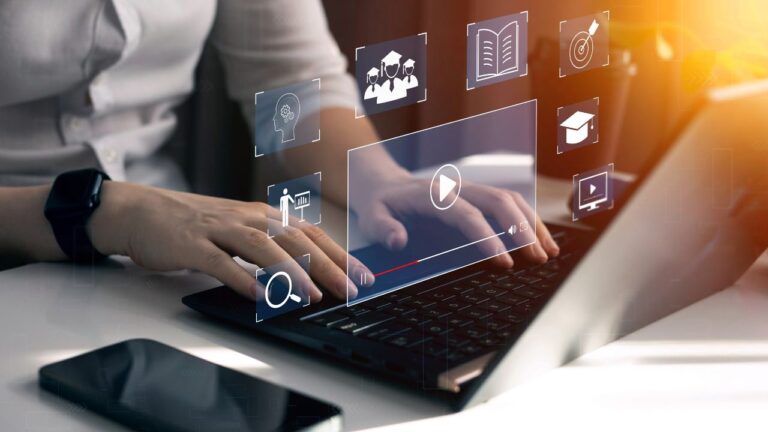Imagine entering a training program where every module is customized just for you—whether you’re a new hire or seeking to upskill in your current role. Adaptive learning caters to varied skill levels and styles, delivering targeted content designed specifically to fill any gaps in knowledge. By incorporating scenario-based learning, simulations, adaptive assessments, and more, these technologies offer immersive experiences that not only engage but also empower you on your professional journey.
As organizations increasingly adopt these strategies for skill-building initiatives, they’re witnessing enhanced employee engagement and retention rates. Embrace adaptive learning as a transformative approach that keeps pace with evolving industry trends while fostering continuous development opportunities tailored just for you.
Understanding Adaptive Learning Technologies
Adaptive learning technologies create personalized learning experiences by adjusting content and pace to suit individual learners. These platforms use real-time data and sophisticated algorithms to tailor educational material, ensuring that each student receives instruction aligned with their unique needs and abilities. By providing customized pathways, adaptive learning optimizes the educational experience, allowing you to progress at your own pace while focusing on areas needing improvement.
Data analytics play a critical role in these technologies. They assess strengths and weaknesses, using insights to adjust instructional strategies dynamically. This process helps identify when additional support or challenges are necessary, promoting a more efficient learning journey.
Different types of adaptive learning platforms exist, each offering unique features such as adaptive assessments or feedback systems. Adaptive assessments modify question difficulty based on previous answers, while feedback systems offer personalized support or scaffolding during the learning process. Together, these tools enhance skill-building opportunities by aligning education with personal development needs.
Embracing adaptive learning technologies allows educators to provide equitable and engaging environments that empower you to take control of your education. The personalization offered aids in developing a deeper understanding of subject matter and improves overall engagement in the learning process.
How Adaptive Learning Works
Adaptive learning technologies drive employee upskilling and reskilling by personalizing educational experiences. This approach focuses on tailoring content to individual learners, enhancing engagement and effectiveness.
1. Key Features and Functions
Adaptive learning platforms incorporate key features that set them apart from traditional methods. They adjust the complexity of tasks based on your performance, ensuring you face the right level of challenge. These platforms use algorithms to analyze your progress and provide tailored recommendations for further study or practice.
2. The Role of AI and Data Analytics
AI and data analytics are central to adaptive learning systems. Intelligent algorithms evaluate your strengths and weaknesses in real time, adjusting content delivery accordingly. By analyzing patterns in your responses, these systems identify areas requiring additional support or advanced challenges.
3. Benefits of Adaptive Learning for Skill Building
Adaptive learning offers numerous advantages for skill building. It allows you to focus on mastering specific skills at your own pace while bypassing familiar concepts. This targeted approach increases retention rates as it aligns training with individual needs, promoting deeper understanding.
4. Personalized Learning Paths
Personalized learning paths ensure you receive a customized educational experience tailored to your current knowledge level and objectives. These pathways adapt dynamically based on ongoing assessments, allowing you to concentrate efforts where they’re most needed.
5. Real-time Feedback and Engagement
Real-time feedback is a cornerstone of adaptive learning systems, providing immediate insights into your performance. This instant response keeps engagement high by allowing quick adjustments in study strategies while maintaining motivation through clear progress tracking.

Adaptive Learning in Corporate Training
Adaptive learning technologies are revolutionizing corporate training by creating personalized, engaging experiences. These systems harness data-driven insights to tailor content and assessments according to individual employee needs.
Transforming Workforce Development
Incorporating adaptive learning into workforce development enhances skill acquisition and retention. By analyzing performance data, these platforms deliver content that addresses specific skill gaps. Employees benefit from customized learning paths aligned with their roles and career goals, fostering a culture of continuous improvement.
Comparing Traditional and Adaptive Training Models
Traditional models rely on generic content delivery, offering little flexibility for individual differences. In contrast, adaptive training models adjust based on real-time data to create active learning environments. They provide personalized feedback and optimize progression speeds according to each learner’s capabilities. This approach not only improves engagement but also reduces time spent on irrelevant material by focusing solely on areas needing improvement.
Implementing Adaptive Learning in Educational Settings
Adaptive learning technologies offer a personalized approach to education, enhancing skill-building by tailoring content to individual needs. For effective implementation, consider various strategies and address potential challenges.
| Aspect | Strategies for Successful Integration | Overcoming Challenges |
|---|---|---|
| Clear Objectives | Set goals that align adaptive learning with educational goals. | Address data privacy concerns by enforcing strict security protocols. |
| Involve Educators | Train educators early on how to use adaptive tools effectively. | Ensure equitable access by providing necessary resources for all learners. |
| Technology Selection | Choose tools that fit your institution’s infrastructure and diverse learning styles. | Monitor and address ongoing technical support needs as technology evolves. |
| Pilot Programs | Run pilot programs before full implementation to identify areas needing improvement. | Provide professional development for educators to adapt teaching methods to new tools. |
| Feedback Collection | Gather input from students and instructors to refine processes and meet expectations. | Ensure continuous updates to adaptive systems and tools based on user feedback. |
| Equitable Access | Plan for access to resources, especially for learners without internet or devices. | Create flexible support plans that address both technical and learning equity challenges. |
Future of Adaptive Learning Technologies
The future of adaptive learning technologies looks promising with continuous advancements in AI and immersive learning. These innovations aim to enhance personalized educational experiences, focusing on skill building.
1. Emerging Trends and Innovations
Adaptive learning technologies will increasingly utilize Artificial Intelligence to predict future learning needs and personalize instruction. Immersive learning technologies like Virtual Reality (VR) and Augmented Reality (AR) offer interactive environments for practical skill acquisition. Advanced analytics will enable data-driven personalization by considering individual preferences and learning styles. Gamification enhancements will further engage learners through dynamic content.
2. Considerations for Future Integration
When integrating adaptive learning technologies, consider factors like data privacy, equitable access, and technical support. Early involvement of educators in planning ensures alignment with educational goals. Training on adaptive tools prepares educators for implementation, while pilot programs help identify necessary adjustments. Ongoing feedback from users refines the system, maintaining a focus on equitable resource access for all learners.
Final Thought
Embracing adaptive learning technologies is crucial for anyone looking to stay competitive in today’s rapidly evolving landscape. These tools empower you to tailor your educational journey, focusing specifically on skills that align with your personal and professional goals. By leveraging AI and data-driven insights, you can create a dynamic learning environment that adjusts in real time to meet your unique needs.
This approach not only enhances skill acquisition but also ensures a more engaging and efficient learning process. As these technologies continue to advance, they’re set to revolutionize how you build skills, offering personalized pathways that cater precisely to where you are and where you want to go. It’s an exciting time for learners ready to take control of their development through innovative methods designed for the future of education.


